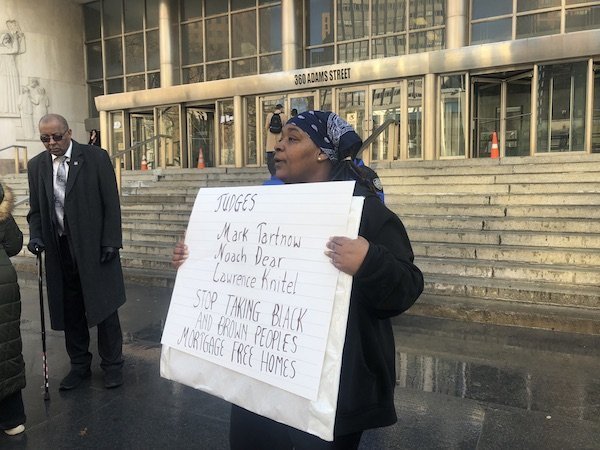With millions of dollars of intergenerational black and brown community wealth on the line, the city argued in federal court filings yesterday, that its Third Party Transfer (TPT) program passes U.S. Constitution muster, and that property owners who have had their fully paid off properties taken with no compensation should be denied recourse in their effort to certify a class action lawsuit.
Under the TPT program – the subject of an ongoing KCP investigative series – the city seizes properties they deem “distressed,” and give them to the public/private non-profit Neighborhood Restore, who in turn give the property for a nominal fee to a qualified non-profit or for-profit developer. The program was created in the late 1970s, when the city had a large number of abandoned and neglected buildings.
However, with gentrification, these properties, and others in the same program, are now worth millions of dollars in market value. Almost all were completely paid for with no mortgage and located in traditionally black and brown neighborhoods, which are becoming increasingly gentrified.
In early March, three of the property owners, McConnell Dorce, Cecilia Jones and Sherlivia Thomas-Murchinson, filed papers in the U.S. Southern District of New York Federal District Court alleging their properties were unconstitutionally confiscated under the in rem foreclosure process.
Their filing was to seek certification to pursue a class action lawsuit, which if successful, could cost the city tens of millions of dollars and the return of dozens of properties.
Their suit was bolstered in late March, when Kings County Supreme Court Judge Mark Partnow ordered the city to give six Central Brooklyn property owners their property back, restoring millions of dollars of intergenerational wealth in the black and Latino community.
The six properties were among more than 60 that were taken in a single in rem court foreclosure action in Dec. 2017 and were then put into the TPT program, violating constitutional rights under the Takings Clause of the Fifth Amendment of the U. S. Constitution, and article 1, section 7, of the New York State Constitution.
Partnow also ruled: “The City has particularly targeted properties that are owned by minorities. The court recognizes that home ownership is an important means for families to build intergenerational wealth. While the Third Party Transfer Program was intended to be a beneficial program, an overly broad and improper application of it that results in the unfair divestiture of equity in one’s property cannot be permitted.”
The city responded to Partnow’s ruling with the filing of a notice of appeal, which gives them six months to file an actual appeal.
But Federal Judge Deborah Batts gave the city yesterday as a deadline to respond to the plaintiffs, and the city responded with a motion to dismiss on two grounds.
Firstly, the city argued that, “This [federal court] lacks subject matter jurisdiction as the complaint challenges municipal action that can and should be litigated in state court.”
This argument follows the Rooker-Feldman doctrine, which states, “a state court judgment was entered providing for property foreclosure and authorizing ownership transfer to the City or a third party. Essentially, plaintiffs now challenge those judgments, asserting that they were secured without due process, in violation of state-law restrictions, and without providing constitutionally-necessary notice and just compensation.
“The Rooker-Feldman doctrine applies to precisely such situations, in which state court “losers” in effect seek to have a federal court renounce such judgments, as opposed to pursuing proper state court remedies.”
The motion does not mention Partnow’s ruling that ordered the city to give back six properties.
The second motion to dismiss argued that the complaint failed to state a claim of relief including that the TPT program is not a taking without just compensation.
“The City’s in rem law and process do not violate the 14th Amendment. It is well-settled that there is no requirement that a former owner receive surplus funds following in rem tax foreclosure,” the city argues.
Case 1:19-cv-02216-DAB






